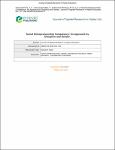| dc.contributor.author | Vázquez Parra, José Carlos | |
| dc.contributor.author | García González, Abel | |
| dc.contributor.author | Ramírez Montoya, María Soledad | |
| dc.date.accessioned | 2020-11-26T23:47:35Z | |
| dc.date.available | 2020-11-26T23:47:35Z | |
| dc.date.issued | 2020-11-19 | |
| dc.identifier.citation | Vázquez-Parra, J. C., García-González, A., & Ramírez-Montoya, M. S. (s. d.). Social Entrepreneurship Competency: An Approach by Discipline and Gender. Journal of Applied Research in Higher Education. Doi: 10.1108/JARHE-09-2020-0317 | es_MX |
| dc.identifier.uri | https://hdl.handle.net/11285/636901 | |
| dc.description.abstract | Purpose - To analyze how university men and women in different disciplines of study in Mexico perceive social entrepreneurship competencies, using a multifactorial analysis to find possible areas of opportunity to reduce the gender gap in social-entrepreneurship-project proposals.
Design/methodology/approach – This is a quantitative study with a validated questionnaire that records the perception levels of five social entrepreneurship sub-competencies. The survey, which includes 28 indicators, was applied to 140 university students from different disciplines. Hypothesis testing was applied to identify significant differences between men and women in each sub-competency by disciplinary area.
Findings - In the global sample, significant differences by gender were observed only in the social value sub-competency. In the disciplinary analysis, significant differences were found in Architecture and Design, Business, and Engineering and Science.
Research limitations/implications - The questionnaire only gathered data about the students' perceptions. To the extent that perception is triangulated with other instruments, it is possible to increase knowledge regarding how to train in social entrepreneurship.
Practical implications - The results can be useful for university training and increasing the envisioning and formulating of government projects by young people who create new businesses.
Originality/value – This research contributes to the literature on the role of gender-specific perceptions of social entrepreneurship in Mexico. | es_MX |
| dc.format.medium | Texto | es_MX |
| dc.language.iso | eng | es_MX |
| dc.relation.isFormatOf | versión publicada | es_MX |
| dc.rights | openAccess | es_MX |
| dc.rights.uri | http://creativecommons.org/licenses/by-nc/4.0 | es_MX |
| dc.subject | HUMANIDADES Y CIENCIAS DE LA CONDUCTA::PEDAGOGÍA::TEORÍA Y MÉTODOS EDUCATIVOS::TEORÍAS EDUCATIVAS | es_MX |
| dc.subject.lcsh | Education | es_MX |
| dc.title | Social Entrepreneurship Competency: An Approach by Discipline and Gender. | es_MX |
| dc.type | Preimpreso/Preprint | es_MX |
| dc.identifier.journal | Journal of Applied Research in Higher Education | es_MX |
| dc.identifier.orcid | https://orcid.org/0000-0002-1274-706X | es_MX |
| dc.identifier.orcid | https://orcid.org/0000-0001-9197-7826 | es_MX |
| dc.identifier.orcid | https://orcid.org/0000-0002-3885-9772 | es_MX |
| dc.subject.keyword | Social entrepreneurship | es_MX |
| dc.subject.keyword | gender | es_MX |
| dc.subject.keyword | disciplines | es_MX |
| dc.subject.keyword | competencies | es_MX |
| dc.subject.keyword | hypothesis testing | es_MX |
| dc.subject.keyword | educational innovation | es_MX |
| dc.subject.keyword | higher education | es_MX |
| dc.description.notes | Effective from September 2017, Emerald has removed the embargo period across all journals for the self-archiving of the Author Accepted Manuscript (AAM). This enables all of our authors to make their article open access via a ‘green’ route. The full text of the article may therefore become visible within your personal website, institutional repository (IR), subject repository, SCN signed up to the Voluntary STM Sharing Principles as soon as the final version has been published in the journal. It may also be shared with interested individuals, for teaching and training purposes at your own institution and for grant applications. | es_MX |
| dc.identificator | 4||58||5801||580104 | es_MX |

